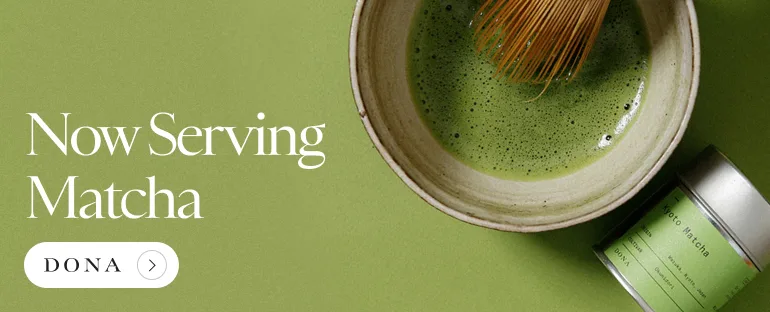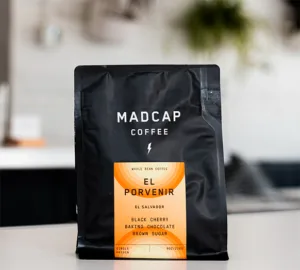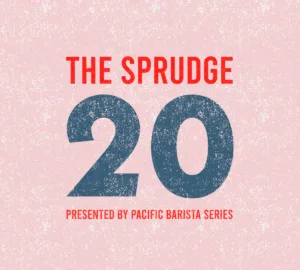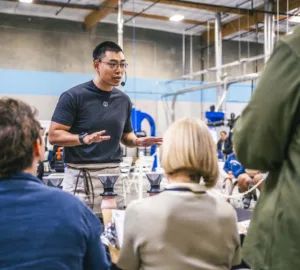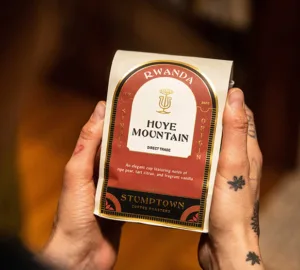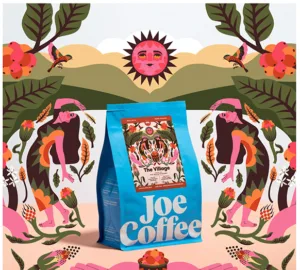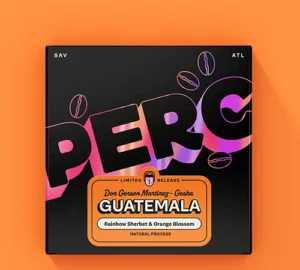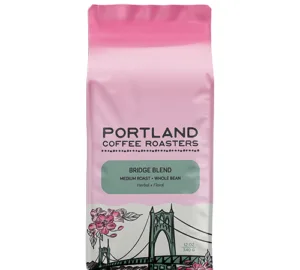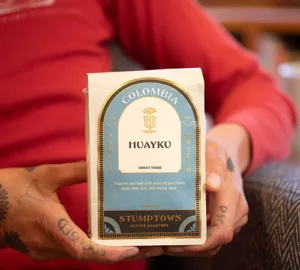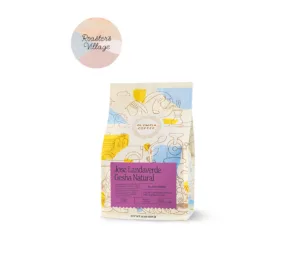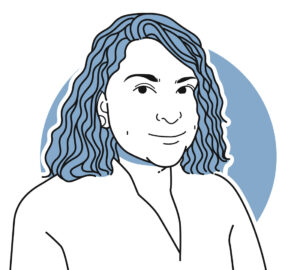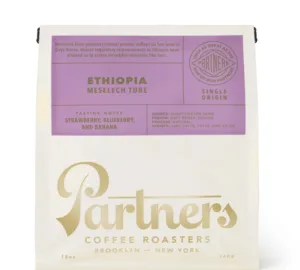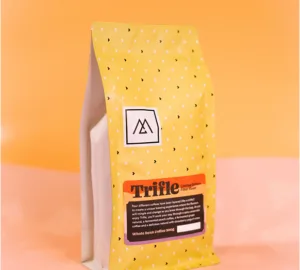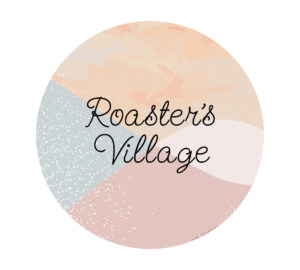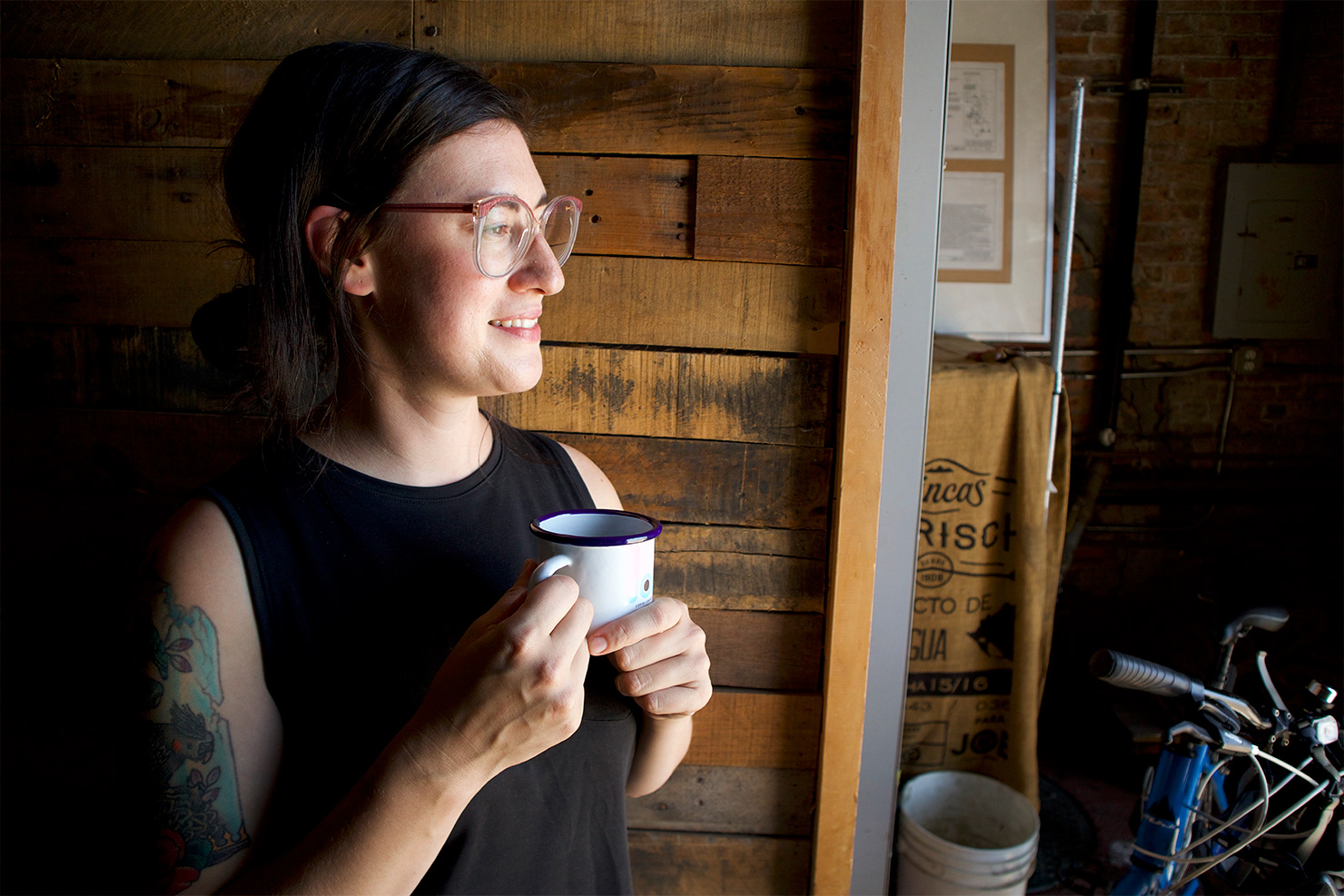
Welcome to The Sprudge Twenty Interviews presented by Pacific Barista Series. For a complete list of 2020 Sprudge Twenty honorees please visit sprudge.com/twenty.
“While Amaris’s Central American heritage and direct family ties in Nicaragua give passion and a unique perspective to her work, she has applied her academic training in research techniques to the science of coffee roasting, QA/QC systems, and the complicated business of the coffee supply chain. Amaris started at Joe Coffee Company in 2015 as a part-time barista at our Pro Shop. In 2016, she joined our roasting team as a Production Roaster, bringing some years of roasting and management experience, and quickly moved into the Director of Roasting position. She has also established herself in the larger coffee community by creating the Women in Coffee Project, a volunteer-run project aiming to highlight the voices of women throughout the coffee supply chain. In her “downtime” from work at Joe, Amaris puts her academic skills to use galvanizing the coffee community by cultivating transparency and providing forums for women to share the stories and experiences that would otherwise be obscured by innate and inequitable gender dynamics.”
Nominated by Jonathan Rubinstein
What issue in coffee do you care about most?
Equity! Equity means so very many things. The others in this incredible Sprudge Twenty “class” are also concerned with equity in their work, which is inspiring. In my day job I think a lot about equitable transparency and how actors in a supply stream can be open about their businesses, goals, and costs with each other to the group’s benefit. Gender equity, though, is where I have focused the most of my attention and energy, even though I’m still learning a lot about its facets myself. I think it encompasses many other aspects of equity. Over time I’ve come to realize that I can do anything, just not everything, so through the Women in Coffee Project (WICP) I focus mostly on women in roles from early stages of production all the way up to export/import—basically, roles which influence a coffee’s production and its journey up to where it enters the country where it will be consumed. Til now I’m less focused on roles within consuming countries, mostly out of respect for the people and organizations who already are doing such great work. I do think there is a larger conversation about what it means for a coffee to be “influenced” or “produced” by women that can and should be ongoing. But we have spent an extraordinary amount of energy in the consuming world to make more equitable workplaces, and yet women make up 75% of the workforce in supply streams before a coffee even reaches the country where it will be brewed into a beverage. Equity involves all of us, to help account for our differences, to help sustain a vision for a collectively powerful future—again, for all of us.
What cause or element in coffee drives you?
In any sector, attempts to accomplish equity will come across the difficulties of how to encourage people of various cultural fluencies to show up for each other and *live* mutual respect. It seems subtle but it is quite complex. It requires us to put our own selves to the side, listen more than we speak, uncover our own subconscious biases, and—my opinion here—it should warrant an internal or external action of some kind. There are many small details to go alongside the big ones, too. The ego—conscious and unconscious—presents as big and small simultaneously. I hope I don’t hurt anyone’s feelings by saying this, but it is hard for me to hear green buyers, businesses, or roasters calling the people who grew their coffee “my” or “our” producers, or any other—even if unintentionally—possessive phrase. It’s a small detail that diminishes the agency of another actor in a supply stream. We need each other and our work should respect everyone else’s. How do we stay aware? How do we discover our own and others’ unique potential to contribute the best part of themselves to our common goals? Subverting exploitation, allowing knowledge to flow in many directions, creating new systems to share risk instead of cornering it in one area of a supply stream, and genuinely celebrating each other’s successes: these all require respect as an active verb.
What issue in coffee do you think is critically overlooked?
It’s astonishing to me that the majority of people around the world who grow coffee or participate in the early stages of coffee production are living below the poverty line.
What is the quality you like best about coffee?
Personally, that I am able to use my career in coffee as an avenue for social responsibility. Professionally, coffee is also an enormously underutilized pathway for economic empowerment. Coffee is full of people with complex skillsets, creatives and logic-lovers alike, who are uniquely capable of changing everything we find to be inequitable about the industry.
Did you experience a life-changing moment of coffee revelation early in your career?
No, I think mine came late! I had already been working in coffee for many years. It happened when I was considering leaving my last coffee job before this one, in 2017, to pursue a different career (the actual career I had studied for in graduate school). I wondered why it felt so hard. At the time I was working for Café Integral, a company that imports and roasts coffee exclusively from Nicaragua. I had been tooling around with it for a long time but it was finally the first time I was able to actively grasp what was important to me—the people in coffee—and how my work is heavily intertwined with my personal identity. It was a true “my whole life has led me to this point” sort of moment. I’m thankful for it, too. As an experience it showed me what I could offer the world, just by being me, a biracial kid growing up in the US in the shadow of two countries’ torrid political history. It also sparked an overwhelming sense of gratitude for the culture of my ancestors, and a great curiosity to learn more about Latin America and the ties that bind us together. Around that time my grandma sent me a poem by Ernesto Cardenal—she always told me that every Nicaraguan was born a poet—and he was a revolutionary, a priest, and a poet. She’d talked to me about him before but I had never read him for myself. I hadn’t ever thought about advocacy, history, or activism as being poetic, and now the converse became tangibly true to me, that poetry itself was a political, historic, and activist act. All of this together prompted me to see coffee in a new light, and also see the benefits of so many cultures participating in one global industry. It was poetic, it was political, and it was powerful. So, to give the ending away, I didn’t leave coffee, I came to work at Joe full-time and here I’ve been with a renewed passion ever since.
What is your idea of coffee happiness?
My weekends lately. An endless morning, in which I make coffee for someone I love, or someone I love makes me coffee, the classical radio station is playing, there are big windows and outside them are blossoming trees, and for hours there are mourning doves and starlings and tiny sparrows who find it impossible to stay quiet.
If you could have any job in the coffee industry, what would it be and why?
This is hard! I love where I work and what I do so much. I think I could work anywhere, as long as constructive dialogue is welcomed, and thoughtfulness is encouraged.
Who are your coffee heroes?
Kimberly Easson, founder of the Partnership for Gender Equity, for her dedication to community-empowered development. Eleane Mierisch, head of Beneficio Don Esteban of Fincas Mierisch in Nicaragua, for her passion, compassion, and leadership. My grandma, who I call Bilita (her first grandkid couldn’t say “abuelita”), just for being alive and being proud of Nicaragua for the coffee that came from the same place that she did. Also, women in coffee all over the world, who are generous with their time and energy, and directly contribute to the greater good of their families, communities, and our industry. There are likely so many inspirational individuals out there I haven’t met yet!
If you could drink coffee with anyone, living or dead, who would it be and why?
Nancy Morejón, a poet who so powerfully conveys the lived experience of women, immigrants, the Latinx diaspora, and, besides that, every single human’s inextricable ties to the history of the world.
If you didn’t work in coffee what do you think you’d be doing instead?
I always look up to people who do what they’re passionate about as well as, and *while*, working in coffee, because in coffee it all comes together. (History, food security, economics, development, epidemiology, linguistics, sociology… the list is never-ending.) I long ago wanted to stay in academia, research how cultural memory evolves and is fragmented through history, and end up working in community archive preservation, but I can—and will!—also do that in coffee. It just might look a little different. But the genetic make-up of that desire was in the seed that germinated with the foundation of the Women in Coffee Project. All the women I’ve interviewed through the WICP have shown me how you don’t have to choose, that a career in coffee can contain so much.
Do you have any coffee mentors?
Lee Harrison, who is both my counterpart in Joe’s sourcing team and also my leadership and coffee mentor. He was running the roasting department at Joe when I started there in 2017. He’s taught me what listening truly means (I definitely thought I did but I definitely didn’t). He taught me friends are supposed to challenge each other, to push each other past their limitations, to show compassion through honesty, and to benefit others as often as conditions allow. I also don’t think I know how to do all of those things, but through working with him I have learned that self-doubt in itself is a part of wisdom. And, to give us many chances to engage with it, the journey of learning continues every day.
What do you wish someone would’ve told you when you were first starting out in coffee?
“There will never be a moment where you know everything about something. You don’t have to try. No one knows everything about something.”
Name three coffee apparatuses you couldn’t do without.
Scale, a broad cupping spoon, and my nose.
Best song to brew coffee to at the moment.
Torn! As might be apparent already, I’m not great at narrowing down to just one favorite! Great question, though. Unlike most roasters, I don’t listen to anything while I roast, but I do like to listen when I brew. When I’m at home in the morning or on the weekends, I prefer dreamier music, like Jeanette’s “Corazon de Poeta” or Lido Pimienta’s “Nada”. If I’m at work, I probably need a Renata Flores song like “Tijeras” to get me going.
Where do you see yourself in 2040?
Professionally, I hope to know another language, be running a financially stable non-profit that grew out of the Women in Coffee Project, be participating in the re-election campaign of the fourth female president, and still be learning something new about myself and the people I work with all the time. Personally, I will have an excellent pencil collection, a few full passports of stamps from places all over the world, and be caring for some happy plants. I will consider my life a resounding success to have those things at the least!
What’s your favorite coffee at the moment?
Our (Joe’s) roast of a coffee from Colombia, produced by Yimi Guarnizo. I met Don Yimi last year. He’s one of ten siblings in a big family—and the second-oldest, just like me!—and right now they’re working together to help each other finish their harvest in the face of travel restrictions and scarcity of labor in their region of Tarqui.
How has the COVID-19 pandemic impacted you personally and professionally?
I’ve grappled with how to answer this question! It’s a yin and yang situation for me. Professionally—we had to lay off 95% of our staff across our company, so when we closed all 21 of our retail locations we went from ~300 employees to 12 employees overnight. It was heartbreaking, and, as I sure was happening in so many places around the world, there was a lot of anxiety and hard conversations. We’ve kept the roastery going, though with a reduced volume, so while it feels surreal to still have a job at the place where I work, it’s unprecedented territory and there are many new things to learn how to grasp. I’m roasting every day, something I haven’t done in a while, and that’s actually helping teach me how to be present at work. Personally, I have benefitted from the quiet! I’m an introvert at heart, but also pretty ambitious in terms of the regular and extracurricular workload I’ve given myself. So the smaller team, lighter email inbox volume, quieter city streets, and other things like that have helped me find myself again. I felt guilty at first for feeling relief in the emotional freedom I found for myself, but I’m learning how to be grateful for it and use this renewed energy to serve my teammates and other folks I love.
Is there any donation fund or resource in your community we can share with our readers?
Yes! I feel very strongly about supporting immigrant and undocumented workers who are the most vulnerable in times like these. There are a few I’d like to recommend if you’ll allow me! In my specific neighborhood of Sunset Park in Brooklyn, there’s Mixteca’s “Emergency Relief Fund.” In my city, NYC, there’s the “Undocu Workers Fund.” And in New York, there’s the New York State Young Leadership Council’s “Emergency Fund for Undocumented Youth and Families.”
What do you see as coffee’s role in the ongoing struggle for civil rights and racial equity?
We’ve been talking about equity in coffee for a very long time, but I believe we’ve somehow missed the mark when it comes to engaging with the true racial disparities of our reality. Maybe this is white fragility on the part of businesses in the specialty/consuming sector, but the ubiquitous role of coffee is powerful. It can support and engage with the universal acknowledgment that we are now in a place where we have to adequately face these hard and uncomfortable truths. They aren’t new. And do something about it. Our main responsibility at the moment is to keep the momentum going, to not lose steam, to not lose sight of the work ahead. Coffee can challenge our employers, colleagues, friends, and, most importantly, ourselves, to continue engaging. I think it’s also worth offering an encouragement to remember the emotional experience that is tied up with coffee everywhere—it can serve as a reminder to also remember compassion, even when righteousness and honesty are on your side.
Are there any activists, authors, public speakers, or experts you’d like to encourage our readers to engage with?
Watch the talk “Black Feminism and the Movement for Black Lives” with panelists Charlene Carruthers (Founding National Director of BYP100, board member of SisterSong) Barbara Smith (Co-Founder of the Combahee River Collective and one of the earliest and most inspirational Black Feminists), and Reina Gossett (activist, writer, and artist, former Membership Director at the Sylvia Rivera Law Project).
There’s also Peggy McIntosh’s Ted Talk. She helped frame the gender equity conversation as only one step on the pathway toward racial equity.
The Sprudge Twenty Interviews are presented in partnership by Sprudge & Pacific Barista Series. For a complete list of 2020 Sprudge Twenty honorees and a complete interview archive, please visit sprudge.com/twenty.













